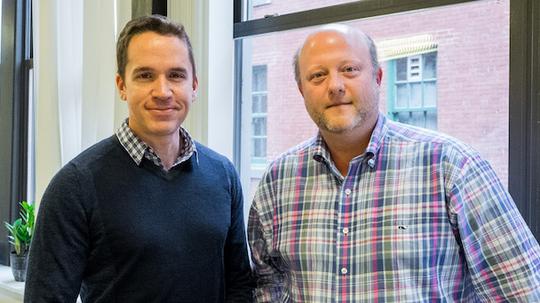
After Brightcove co-founder Jeremy Allaire stepped down as CEO in early 2013, he got together with Sean Neville, who previously worked with Allaire as a senior software architect, and began talking about money. More specifically, they were exploring a question: Can you make money work like Facebook and other popular Internet services?
In recalling the origin of Circle, a Boston fintech startup the two started in 2013, Neville said he and Allaire were ultimately exploring ways to make the act of transferring cash to friends and family like sending a tweet or messaging a friend — fast, easy and free, with the ability to do so across the world, from any country.
Using blockchain technology to power Circle's backend, the company's platform, which includes apps for iPhone and Android, reached over $1 billion in transactions last year while its global customer base has grown 300 percent in the past 12 months. Recently, the company announced that customers in the United States, United Kingdom and Europe can now transfer money with no fees or markup on foreign exchange rates.
But Circle isn't the only Boston startup that's shaking up the way money changes hands. While Circle focuses on peer-to-peer money transfer, an MIT-born startup called Flywire aims to make it easier and cheaper to transfer large dollar amounts across country borders to businesses, hospitals and academic institutions.
Together, the two companies have processed billions of dollars in transactions and raised nearly $180 million in capital from investors, including Goldman Sachs and a venture capital firm associated with Fidelity Investments' parent company. While one of them has brought in tens of millions of dollars in revenue and is already profitable, the other is squarely focusing on growth above all while bringing in some money. This is the story of how two Boston fintech startups are shaking up the payments industry.
Flywire goes after big international money
Flywire got its start in 2009 when its founder, Iker Marcaide, experienced some of his own problems with making international payments to his school, the Massachusetts Institute of Technology. After sending a tuition payment from his home country of Spain, Marcaide realized the payment somehow got lost in the process. When Marcaide looked into it, he discovered that the cross-border payment process was inefficient and full of hidden costs. For Marcaide, that meant a big opportunity to help international students like him.
For the first few years of Flywire — which was originally called peerTransfer — the startup was completely focused on making it easier and cheaper for international students to send large, cross-border payments to academic institutions. But starting in October 2015, Flywire made its first expansion beyond education, into healthcare, giving people across the globe a better way to pay for overseas medical treatments. Then, earlier this year, Flywire announced it was expanding into international business-to-business payments.
Flywire has raised $43.2 million to date, and its investors include F-Prime Capital, Bain Capital Ventures and Accel Partners.
To date, Flywire has processed over $5 billion in cross-border payments, with $2 billion of that happening in the last fiscal year alone. For the 2017 fiscal year, the company expects to process roughly $3 billion. Across its three businesses, Flywire has 1,400 clients across 20 countries that accept payments using its system. While education is still Flywire's largest business, Mike Massaro, the company's CEO, told BostInno that its B2B division is already taking off.
"The business segment continues to accelerate at a scale we’ve never seen before," Massaro said. While he declined to discuss specifics, he said revenue is in the tens of millions and the company has been profitable for the last two years.
So what has led to so much growth over the past few years? For one, the company has been able to negotiate favorable foreign exchange rates with global banks, costing customers less than if they were to use a traditional bank or wire transfer service. The company also accepts payments in more than 100 local currencies from over 200 countries and territories. Another important factor, Massaro said, is Flywire's friendly user experience, which includes providing customer support 24 hours a day, seven days a week.
"I think that’s where we’re disrupting," Massaro said.
The company has also increased the number of ways Flywire customers can make payments. Most recently, it announced on Monday that customers in the United States, Canada, United Kingdom and European Union can now pay using PayPal. Other supported payment methods include MasterCard, American Express, WeChat and AliPay.
Flywire's growth to over 180 employees in eight offices across the globe has been aided by three acquisitions it's made in less than three years. Its most recent acquisition was PACE Invoice, a London-based company whose multi-currency invoicing platform is being used to help Flywire's business, healthcare and education clients create better invoices.
What could come next for Flywire? Massaro said banks have asked the company if they could white-label Flywire's service, meaning they would pay to offer it to customers, possibly without Flywire's name. "That's a possibility for us," he said.
Circle, a blockchain-powered consumer hit
Circle is among a number of growing companies that are using blockchain — a distributed database, or digital ledger, that is typically managed by a peer-to-peer network — to power its online payments platform. When the startup first launched in 2014, it only supported the ability to buy and sell Bitcoin, the first cryptocurrency powered by blockchain.
However, Circle never intended to stick with Bitcoin as its main currency, Neville, Circle'spresident and co-founder, said. Instead, its long-term plans were to support currencies that everyday people use, like U.S. dollars or euros. The reason it couldn't support those currencies at launch is that Circle had to get approval for each regulated currency.
"We never saw [Bitcoin] as something that would replace [U.S.] dollars or euros or sterling, or even as something that many people would necessarily care about relative to the use cases they're solving," Neville said.
While Circle has moved away from Bitcoin on the frontend, blockchain remains an important aspect of how Circle works. With blockchain, Nelville said, "it was possible to decentralize and distribute money transfer through trusting the technology in cryptography, instead of trusting and paying a bunch of human beings and banks and closed networks that do the same thing."
Circle has raised $136 million, and its investors include Goldman Sachs, General Catalyst and Flywire investor Accel Partners. Last summer, the company raised a $60 million round that included a number of Chinese firms as it expanded to China, where Circle focuses on allowing Chinese citizens to send money in and out of the country.
Through blockchain and cryptocurrency trading, Circle is able to facilitate cross-border payments with no fees or markup on foreign exchange rates in the U.S., U.K. and Europe. With the company having seen a 10-fold increase in European customers over the last 12 months, the move is expected to futher boost Circle's presence there. But there is an obstacle: Some people have a hard time believing that you can make international payments without a fee.
"Sometimes for cross-currency payments, they're even suspicious if they don't see a fee, but I think we'll come to a point where it's expected that there is no fee for turning dollars into euros, or vice versa," Neville said.
"We'll come to a point where it's expected that there is no fee for turning dollars into euros, or vice versa."
What has helped Circle grow its user base in the triple digits is the network effect of sending money to one or multiple people using the app, which then prompts those people to use it. Circle has also integrated with Apple's iMessage platform.
"You can see many, many disconnected networks of people paying two or three friends and then slowly seeing all these separate networks get connected to one another," Neville said. "Those are pretty classic indicators of product market fit and when you see those things it's pretty exciting."
As for what's next, Neville hinted that Circle may be working on some kind of product related to lending— something that was recently echoed in a company blog post, which also mentioned the possibility of creating "new avenues for saving and investing." While the company is bringing in some revenue through cryptocurrency right now, these are the kinds of things that could really turn on the company's revenue-generating machine.
"I think that if you include [lending] as part of what Jeremy, my co-founder, calls the 'time value of money' — which is [the idea that] 'I have money now but I don't necessarily need it and you need it now so there's' some sort of exchange that happens' — I think there's a bucket of products that fit into the time value of money that is worth exploring," he said.
Clarification: This story has been updated to clarify that F-Prime is not the venture capital arm of Fidelity.








